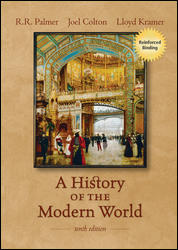
History of the Modern World, 10th Edition (Palmer)Chapter 6: The Scientific View of the WorldChapter OverviewIn the seventeenth century, science became modern. Scientific methods were defined, and scientific knowledge was increasingly applied practically. Scientific thought influenced popular culture, reshaped conceptions of God and the universe, and was heralded as the main force of progress. Bacon and Descartes set the precedents for empiricism, the scientific method, and orderly explanations of the world. Scientists like Copernicus, Kepler, and Galileo transformed understandings of planetary motions, which Newton refined into a theory of the universe which human reason made knowable. Scientific breakthroughs and new knowledge of the world outside Europe produced an important current of thought, skepticism, which transformed the historical sciences and led to the questioning of traditional beliefs. Science also influenced political theory, which embraced the philosophy of natural law. Human beings were considered rational, and states were subjected to the rigors of reason as well. The faith in science, progress, reason and rationality would fuel the cultural revolution of the Enlightenment in the next century. |  |















